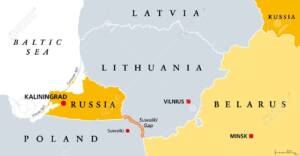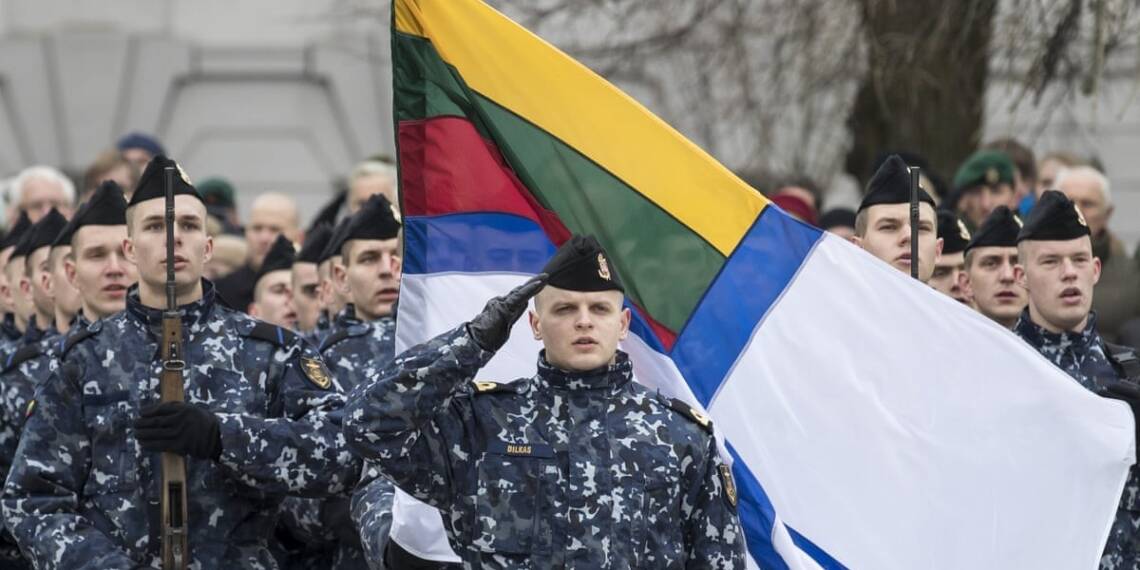Wimps cry. Opportunists conquer them. Lithuania is crying and Germany is devouring it.
The issue the world faces is not actual danger, but rather how danger is perceived. Certain wimps avoid leaving their homes, driven by an exaggerated fear of potential accidents or confrontations. This behavior is based on imaginary threats. An example of such behavior can be seen on a national level with Lithuania, which harbors an undue fear of Russia, despite likely being a low priority for Russia. Opportunists have historically exploited such fears for their own gain, and in this scenario, Germany is taking advantage of Lithuania’s unfounded apprehensions.
Join us on Telegram: https://t.me/tfiglobal
To grasp the context of Lithuania’s exaggerated fear and Germany’s surprising assistance, it’s essential to first familiarize ourselves with two geographical locations: the Suwalki Corridor and the Kaliningrad Oblast. The Suwalki Corridor is a slender land passage around 65 kilometers long, linking Poland and Lithuania. On the other hand, the Kaliningrad Oblast serves as Moscow’s most western federal territory, positioned near the center of Europe.
Nestled between Belarus and the Kaliningrad Oblast of Russia, the Suwalki Corridor is like the narrow hallway of high-stakes geopolitical tension, where a Russian misstep could send the entire Baltic region into a diplomatic whirlpool. With the backdrop of the Ukraine situation, it seems the Baltic states have started to feel a bit like the next dominoes in line. “Are we next?” Lithuania muses, while flipping through survival guides.

Read More: France, Germany and The UK are racing to get out of RUSSIA’s WAY
According to the German press, Lithuania isn’t just sitting around waiting for the storm; it’s actively preparing for an unwelcome party, stockpiling over 3,300 shelters. These aren’t your average hideouts; we’re talking about a makeover for underground corridors and school basements into cozy, bunker-style retreats. Yet, the Foreign Minister hints they’re still a tad short on accommodations, boasting space for a welcoming 900,000 people.
Schoolchildren in Lithuania are getting an education with a twist, where survival courses include the basics of first aid and, intriguingly, how to handle weapons. It’s an innovative take on “extracurricular activities,” I must say!
Supporting Ukraine has become a key part of the Baltic self-defense strategy, blending solidarity with practicality. Latvia, for instance, has invested 1% of its GDP into this effort.
Their message to any potential aggressors is simple and to the point: “We’d rather you didn’t visit, thanks. We’re quite attached to every centimeter of our land, and we’ve got our NATO buddies on standby.” It’s a polite but firm RSVP to any unwelcome party crashers, with a side note that they’re also upping their game against any sneaky hybrid attacks.
It’s intriguing to note the lack of any threats from Russia, a country not known for its subtlety, especially when it comes to geopolitical bravado. No pompous declarations from Russian officials or even a hint of braggadocio. Even when Lithuania threw a curveball by halting the flow of goods like coal, metals, and other stuff to Russia’s Kaliningrad, essentially grounding over half of the enclave’s trade, Russia’s reaction was surprisingly…chill.
After a stern “Hey, not cool” from Russia, things mysteriously drifted back to the status quo. So, if Russia didn’t turn Lithuania into a cautionary tale over a major logistical snafu, why would it start now?
But Germany is not Russia, and it is making full use of Lithuania’s misplaced fear.
Germany is gearing up to send two whole combat battalions to Lithuania, just to keep things interesting post-Ukraine invasion anniversary.
Germany is stationing troops a mere stone’s throw (that is if you can throw a stone 100km) from Russia. They’re betting this will keep Lithuania off Moscow’s dance card, especially that tempting tango over the Suwalki Gap.
Read More: So, just how strong is Russia’s Military?
Germany is sending 5,000 soldiers to Lithuania. It’s the first time since World War II that German troops are setting up shop permanently. Never a good thing. Never a good thing.
A similar thing was done by the UK. The war was getting over in just two months as the Wimpy Ukraine was ready to sign any paper. Then came Boris Johnson in all his hairy wonder and rest is a bloody history.







